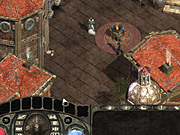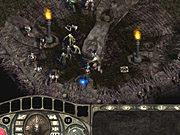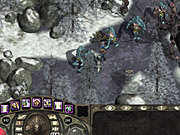Lionheart Designer Diary #3
Reflexive designer Bryce Baker discusses the final stages of Lionheart's development and what it's like to design content for an expansive computer RPG.
Entry #3 - 01/30/03
By Bryce Baker,
Reflexive Entertainment
Lionheart will be an unusual computer role-playing game in which players will explore an alternate-history version of medieval Europe. Players will be able to learn to wield swords and sorcery while consorting with the likes of William Shakespeare and Leonardo da Vinci. The game is being developed by Reflexive Entertainment with direct input from Black Isle Studios. In this designer diary, Reflexive Entertainment designer Bryce Baker discusses the final stages of the game's development and looks back at how the game started out as a series of ideas and is now coming together as an actual game.

Somewhere along the line, all the hours I spent as a kid playing Dungeons & Dragons and classic computer games like Adventure and Telengard all the way through to modern games like Planescape: Torment and Icewind Dale made me employable. Yeah, it doesn't sound very likely, but somebody has to win the lottery, so call me Mr. Lucky. I'm a designer here at Reflexive Studios, where we're finishing up work on Black Isle's next role-playing game, Lionheart. My involvement with the project began last summer as a contract writer. I joined Reflexive full time in October, just in time for the final crunch to finish the game.
For those not yet familiar with the title, it's a role-playing game set in an alternate-history version of 16th-century Spain on the eve of the armada's departure, when monsters and magic are more than just stories told to scare kids and the Inquisition has real heretics and demons to fight.

Being a designer is a lot like playing with Lego blocks all day, which is OK, since we have some seriously cool blocks to play with. The artists and programmers do all the real work--they make the blocks--and all we designers have to do is invent stories and situations to put them in. All the scripting and artificial intelligence routines are hooked up through a high-level programming language the real programmers have invented, so that telling a monster, "Do this and this, but not that," is simply a matter of connecting a few logic blocks to whatever you're working with. It's like magic, really. You ask the programmers or artists to make an asset or invent a behavior and it just sort of appears out of nowhere a few days or weeks later. At this point in the project, we've already made the castles, cathedrals, and dungeons, and we are going through the game-balancing process and applying polish.
For developers, role-playing games have to be a labor of love, because at the end of the day, no matter how much time you spent playing D&D as a kid, making RPGs is a lot of work. Not only do you have to generate massive amounts of content--monsters, spells, plots, subplots, dialogue, locations, items, and so on--but you also have to invent an expansive game system through which players interact with everything you've made. Because RPGs have a rich pen-and-paper heritage where the action was limited only by the imagination of the DM, players are accustomed to playing them as any of a number of different character types. A good RPG has to be fun for a player who likes to wade knee-deep in the blood of his enemies but still be fun for the player who likes a sneaky character, or a diplomat, or a wizard.
Made SPECIAL for You
Balancing all this is challenging enough when you have an existing rule set to transfer to the medium, but making a rule set from scratch on top of everything else that has to be generated is a Herculean task. We were fortunate to start with a proven system, SPECIAL, which is familiar to players of the Fallout series. Adapting it to a real-time, fantasy setting and making it fun in our setting has been the focus of much of our work in the past few months.

Early on in the development process, we roughed everything out on paper and then set about generating the story, the locations, and all the general "stuff" in the game. Now that the programmers and artists have implemented everything, we can sit down and play through our ideas. In some cases, theory moved smoothly to practice. Unarmed characters, for instance, required only very minor tweaks to make them competitive throughout the game. Other character archetypes required more attention to get them just right. As any player of EverQuest can tell you, it's an iterative process of "buffing" (or strengthening) and "nerfing" (or weakening) the classes. It's a lot of fun, and a great excuse to spend all day playing a game and much of the night staring at whiteboards covered with numbers.
Dungeons and wilderness encounters are also getting their share of balancing and polishing. The Reflexive team had the foresight early on in development to implement a "mojo" system that looks at the level of your character and generates encounters accordingly. This has simplified matters immensely, particularly early in the game, when the plot is very open-ended and a few character levels make a big difference. There are limits--the system doesn't let you go into an area you really aren't powerful enough to handle and fight your way through, so you'll still have the pleasure of returning to an area that beat you up early on the game and whomping on everything there--but it's great for fine-tuning both characters who have done a lot of side quests and characters who have just played straight through the game.
"We were fortunate to start with a proven system, SPECIAL, which is familiar to players of the Fallout series."-Bryce Baker, Reflexive Entertainment
Here comes my requisite spiel about how great it is to watch all the work we've done thus far on the game come together and make a great whole. I think every designer diary has a comment like that at some point. It's kind of like having a baby, I think. Watching something you've put a lot of thought and effort into turning the corner from being work to being fun, from being a bunch of AI conditions and triggers to being a world--it must turn on some of the same genes that make new parents gush about all the cute things their baby does.
We're getting very, very close to finally completing the game, so we hope to see Lionheart in stores in a few months. If you'd like to find out more about Lionheart, you can check out the official Lionheart Web site and visit the message boards.
Got a news tip or want to contact us directly? Email news@gamespot.com
Join the conversation